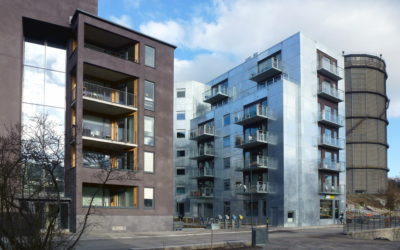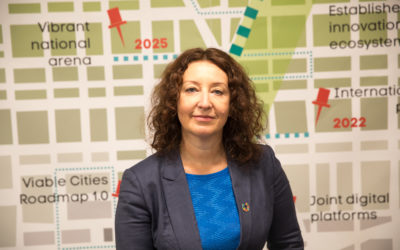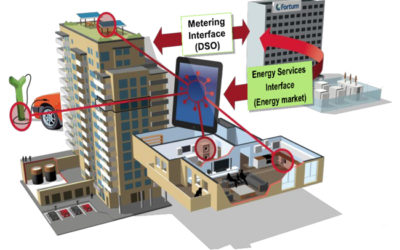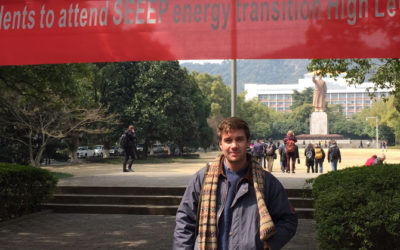About us
Team
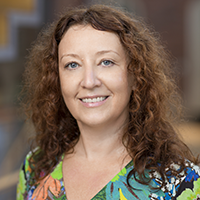
Olga Kordas
Group leader
I am a Director of KTH Energy Platform, responsible for facilitating interdisciplinary energy research at KTH and enhancing collaboration with funding institutions, industry, local authorities and other societal stakeholders in Sweden and internationally.
Since the beginning of 2015, I am KTH’s coordinator of STandUP for Energy – a collaboration initiative between Uppsala University, KTH, Swedish University of Agricultural Sciences and Luleå University of Technology, which brings together leading research groups to enable sustainability transition of the energy system.
Since 2001, I am a researcher at the Division of Industrial Ecology (IE), Department of Sustainable Development, Environmental Sciences and Engineering (SEED), KTH.
I am a co-founder and a leader of a new research group called “Urban Analytics and Transitions” (
My main research areas are complex system simulation, energy system analysis, participatory backcasting for strategic energy planning, and engineering education in sustainable development.
I am a KTH’s programme coordinator for the KIC InnoEnergy Master program in Smart Cities.
Selected publications
-
Kordas, O., Liu, G., Ulgiati, S., 2017. Energy and urban systems. Applied Energy 186 (2), 83-85. https://doi.org/10.1016/j.apenergy.2016.10.112
-
Pereverza, K., Pasichnyi, O., Lazarevic, D., Kordas, O., 2017. Strategic planning for sustainable heating in cities: a morphological method for scenario development and selection. Applied Energy 186(2). https://doi.org/10.1016/j.apenergy.2016.07.008
-
Zivkovic, M., Pereverza, K., Pasichnyi, O., Madzarevic, A., Ivezic, D., Kordas, O., 2016. Exploring scenarios for more sustainable heating: the case of Niš, Serbia. Energy 115(3). https://doi.org/10.1016/j.energy.2016.06.034
-
Pasichnyi, O., Wallin, J.,
Levihn , F., Shahrokni, H, Kordas, O., 2017. Energy Performance Certificates — new opportunities for data-enabled urban energy policy instruments? Proceedings of the 10th Biennial International Workshop on Advances in Energy Studies, Naples. -
Pasichnyi, O., Wallin, J., Shahrokni, H., Kordas, O., 2017. Data-driven building archetypes’ generation for urban building energy modelling. Proceedings of the 10th Biennial International Workshop on Advances in Energy Studies, Naples.
-
Mörtberg U., Goldenberg, R., Kalantari, Z., Kordas, O., Deal, B., Balfors, B., Cvetkovic, V. 2017. Integrating ecosystem services in the assessment of urban energy trajectories – A study of the Stockholm Region. Energy Policy 100: 338-349. https://doi.org/10.1016/j.enpol.2016.09.031
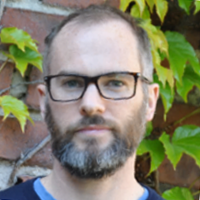
David Lazarevic
Researcher
Since 2009, I have been working at the interface between industrial ecology, science and technology studies, and waste and innovation policy. My research interests are centred on the legitimacy of processes in social coordination, the processes of socio-technical change toward more sustainable energy and material flows, and policy analysis applied the circular and bio economy.
Selected publications
- Kangas, H-L., Lazarevic, D., Kivimaa, P. 2018. Technical skills, disinterest and non-functional regulation: Barriers to building energy efficiency in Finland viewed by energy service companies. Energy Policy. 114C: 63-76. https://doi.org/10.1016/j.
enpol.2017.11.060 - Antikainen, R., Lazarevic, D., Seppälä, J. 2018. Circular economy: Origins and Future Orientations. in Lehmann, H. Factor X . Challenges, Implementation Strategies and Examples for a Sustainable Use of Natural Resources. Springer. https://doi.org/10.1007/978-3-
319-50079-9_7 - Kivimaa, P., Kangas, H-L., Lazarevic, D. 2017. Client-oriented evaluation of ‘creative destruction’ in policy mixes: Finnish policies on building energy efficiency transition. Energy Research and Social Science. 33: 115-127. https://doi.org/10.1016/j.
erss.2017.09.002 - Lazarevic, D. and Valve, H. 2017. Narrating expectations for the circular economy: towards a common and contested European transition. Energy Research and Social Science. 31: 60-69.https://doi.org/10.1016/j.
erss.2017.05.006 - Lazarevic, D. and Martin, M. 2016. Life cycle assessments, carbon footprints and carbon visions: Analysing environmental systems analyses of transportation biofuels in Sweden. Journal of Cleaner Production. 137: 249-257. https://doi.org/10.1016/j.
jclepro.2016.07.075 - Franzese, P.P., Lazarevic, D., Reddy, S. 2016. Energy and Urban Systems. Journal of Environmental Accounting and Management. 4(2): 101-103. https://doi.org/10.5890/JEAM.
2016.06.001 - Lazarevic, D. 2016. The legitimacy of life cycle assessment in the waste management sector. The International Journal of Life Cycle Assessment. https://doi.org/10.1007/
s11367-015-0884-9 - Shahrokni, H., Årman, L., Lazarevic, D., Nilsson, A., Brandt, N. 2015. Implementing Smart Urban Metabolism in the Stockholm Royal Seaport: Smart City SRS. Journal of Industrial Ecology, 19(5): 917-929. https://doi.org/10.1111/jiec.
12308 - Shahrokni, H., Lazarevic, D., Brandt, N. 2015. Smart Urban Metabolism: Toward a Real-time Understanding of the Energy and Material Flows of City and its Citizens. Journal of Urban Technology,22(1): 65-86. https://doi.org/10.1080/
10630732.2014.954899 - Buclet, N. and Lazarevic, D. 2015. Principles for sustainability: the need to shift to a sustainable conventional regime. Environment, Development and Sustainability. 17(1):83-100.https://doi.org/10.1007/
s10668-014-9539-4 - Laurenti, R., Lazarevic, D., Poulikidou, S., Montrucchio, V., Bistagnino, L., Frostell, B. 2014. Group Model-Building to identify potential sources of environmental impacts outside the scope of LCA studies. Journal of Cleaner Production. 72(1 June): 96-109. https://doi.org/10.1016/j.
jclepro.2014.03.001
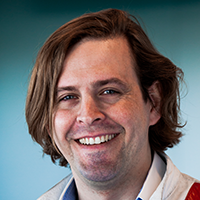
Fabian Levihn
Postdoctoral research fellow
I have a background with a master in mechanical engineering and a PhD in Industrial Economics an Management where I focused on least cost integrated planning models in an energy/climate change context. Today I research techno-economic systems, in particular how increased renewables affect energy markets, and the conditions for bioenergy CCS.
Selected publications
- Dimoulkas, I., Amelin, M., Levihn, F. 2017. ”District heating system operation in power systems with
high share of wind power”. Journal of Modern Power Systems and Clean Energy, vol. 5, pp. 850-862. - Levihn, F. 2017. “CHP and heat
pumps to balance renewable power production: Lessons from the district heating network in Stockholm”. Energy, vol. 137, pp. 670-678. - Levihn, F. 2016. “On the problem of optimizing through least cost per unit, when costs are negative: Implications for cost curves and the definition of economic efficiency”. Energy, vol. 114, pp. 1155-1163.
- Sandell, U.,
Levihn , F., 2016. “From Products to Solution: Issues of Strategic Alignment”. Journal of Business-to-Business Marketing, vol. 23, pp. 207-219. - Levihn, F., Nuur, C., 2016. “Co-benefits of primary energy
conservation, reduced emissions and costs through biomass and waste incinerationchp in district heating”. International Journal of Energy Production and Management, vol. 1, pp. 87-96. - Levihn, F., 2015. Investments, system dynamics, energy management, and policy: a solution to the metric problem of
bottom up supply curves. PhD Dissertation, KTH. Levihn, F., Nuur, C., Laestadius, S., 2014. ”Marginal abatement cost curves and abatement strategies: taking option interdependency and investments unrelated to climate change into account”. Energy, vol. 76, pp. 336-344. Sharokni , H.,Levihn , F., Brandt, N., 2014. ”Big meter data analysis of the energy efficiency potential in Stockholm’s building stock”. Energy and Buildings, vol. 78, pp. 153-164.- Levihn, F., Nuur, C., 2014. “Biomass and waste incineration CHP: the co-benefits of primary energy savings, reduced emissions and costs”. WIT – Transactions on Ecology and the Environment, vol. 190, pp. 127-138.
- Levihn, F., 2014. “CO2 emissions accounting: Whether, how, and when different allocation methods should be used”. Energy, vol. 68, pp. 811-818.
- Levihn, F., Nuur, C., Blomgren H., 2011. “Corporate response to climate change mitigation: What can we learn from annual reports of European industries?”. International Journal of Industrial Engineering and Management, vol. 2, pp. 77-86.

Aram Mäkivierikko
PhD candidate
The aim of my PhD research is to design and evaluate methods of increasing the environmental and social sustainability in neighbourhoods using ICT. More specifically, I am studying how the introduction of LocalLife, a local social network, can be used to increase the local sustainability. The research includes:
– to design a way of measuring social sustainability on household and neighbourhood level, and using it to measure the effects of introducing the local social network in a neighbourhood.
– to design energy feedback within the context of a local social network, and to evaluate its effectiveness in terms of increased environmental awareness and behaviour change towards increased sustainability among the residents
My background is M.Sc. in Energy Systems Engineering and B.Sc. in Computer Science, both from Uppsala University.
Selected publications
- Mäkivierikko, A., Shahrokni, H. and Kordas, O., 2017. Overcoming the Engagement Barrier in Demand-Side Management Using Social Influence. In:
BIWAES 2017 – 10th Biennial International Workshop Advances in Energy Studies.
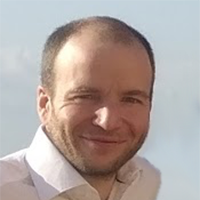
Marco Molinari
Researcher
I actively participated in three international research projects and have been a main contributor to the International Energy Agency ECBCS Annex 49 final guidebook, “Detailed Exergy Assessment Guidebook for the Built Environment”. I am author of several scientific articles and I am in the editorial board of International Review of Applied Sciences and Engineering. I have been supervisor of several theses in the field of low energy buildings design, energy management and conservation in the built environment and in buildings’ controls.
My research interests focus on smart buildings and on the integration of Information and Communication Technologies in the built environment, including energy monitoring and deployment of advanced control approaches, as well as on passive techniques and integrated design for low energy buildings.
Selected publications
- M. Molinari, A. Lazzarotto, F. Björk, The Application of the Parametric Analysis for Improved Energy Design of a Ground Source Heat Pump for Residential Buildings, Energy and Buildings, 63, 119-128, 2013.
- N.W.O. Brown, T. Malmqvist, W. Bai, M. Molinari, Sustainability Assessment of Renovation Packages for Increased Energy Efficiency for Multi-family Buildings in Sweden, Building and Environment, 61, 140-148, 2013.
- G. A. Johannesson, M. Molinari, Exergy Analysis of Single- and Multi-Step Thermal Processes, Journal of Civil Engineering and Architecture 59, 1384-1391, 2012.
- A. Müller, L. Kranzl, P. Tuominen, E. Boelman, M. Molinari, A.G.
Entrop , Estimating Exergy Prices for Energy Carriers in Heating Systems: Country Analyses of Exergy Substitution with Capital Expenditures, Energy and Buildings, 43, 3609–3617, 2011.
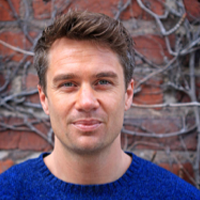
Anders Nilsson
PhD candidate
Selected publications
- Nilsson, A., Lazarevic, D., Kordas, O., Brandt, N., 2017. Influencing Household Energy Consumption: The Active House in Stockholm Royal Seaport. Book of Proceedings of the International Workshop “Advances in Energy Studies”, Naples, Italy, September 25-28, 2017.
- Nilsson, A., Brandt, N., 2016. Proposing an Hourly Dynamic Wind Signal as an Environmental Incentive for Demand Response. Advances and New Trends in Environmental Informatics. https://doi.org/10.1007/978-3-319-44711-7_13
- AlSkaif, T., Guerrero Zapata, M., Bellalta, B., Nilsson, A., 2016. A Distributed Power Sharing Framework Among Households in Microgrids: A Repeated Game Approach. Computing, July 2016. https://doi.org/10.1007/s00607-016-0504-y
- Nilsson, A., Stoll, P., Brandt, N., 2015. Assessing the impact of real-time price visualization on residential electricity consumption, costs, and carbon emissions. Journal of Resources, Conservation & Recycling. https://doi.org/10.1016/j.
resconrec.2015.10.007 - Shahrokni, H., Årman, L., Lazarevic, D., Nilsson, A., Brandt, N., 2015. Implementing Smart Urban Metabolism in the Stockholm Royal Seaport: Smart City SRS. Journal of Industrial Ecology, 19: 917–929. https://doi.org/10.1111/jiec.12308
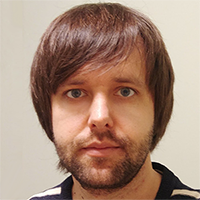
Oleksii Pasichnyi
PhD candidate
Selected publications
-
Pereverza, K., Pasichnyi, O., Lazarevic, D., Kordas, O., 2017. Strategic planning for sustainable heating in cities: a morphological method for scenario development and selection. Applied Energy 186(2). https://doi.org/10.1016/j.apenergy.2016.07.008
-
Zivkovic, M., Pereverza, K., Pasichnyi, O., Madzarevic, A., Ivezic, D., Kordas, O., 2016. Exploring scenarios for more sustainable heating: the case of Niš, Serbia. Energy 115(3). https://doi.org/10.1016/j.energy.2016.06.034
-
Pasichnyi, O., Wallin, J.,
Levihn , F., Shahrokni, H, Kordas, O., 2017. Energy Performance Certificates — new opportunities for data-enabled urban energy policy instruments? Proceedings of the 10th Biennial International Workshop on Advances in Energy Studies, Naples. -
Pasichnyi, O., Wallin, J., Shahrokni, H., Kordas, O., 2017. Data-driven building archetypes’ generation for urban building energy modelling. Proceedings of the 10th Biennial International Workshop on Advances in Energy Studies, Naples.
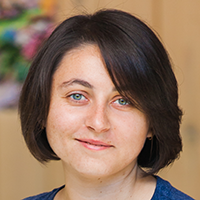
Kateryna Pereverza
Researcher
I am a researcher at the Department of Sustainable Development, Environmental Sciences and Engineering (SEED), KTH. I’m exploring approaches for transformative systems changes for sustainability in close collaboration with societal partners through the transdisciplinary research design. I have refined the modular Participatory backcasting (mPB) toolbox and currently studying the emerging portfolio approaches for steering urban transitions to climate-neutrality. I’m open to experimentation with innovative ways to learn and facilitate learning in collaboration with others.
I have an interdisciplinary background with a PhD in Industrial Ecology (KTH Royal Institute of Technology – Sweden), a Master’s Degree in Social Informatics (IASA, National Technical University of Ukraine “KPI” – Ukraine) and a Bachelor’s Degree in Applied Mathematics (IASA, National Technical University of Ukraine “KPI” – Ukraine). I also gained an extensive project management experience of social innovations (I have co-founded and successfully developed for 10 years a multidisciplinary international summer school AACIMP).
I have defended my PhD thesis “Steering sustainability transitions? Modular participatory backcasting for strategic planning in the heating and cooling sector” in April 2019. My PhD study was based on two full-scale participatory backcasting projects implemented in cities of Ukraine and Serbia and aimed at strategic planning towards more sustainable heating and cooling systems by the year 2050. Since 2019 I’m collaborating with the Swedish Strategic Innovation programme “Viable Cities” to explore how they design and implement transformative innovation policy to support cities in achieving climate-neutrality by 2030.
Since 2016 I am developing and teaching AL2115 “Transdisciplinary Approaches for System Innovations” course for students of KIC InnoEnergy master program “Energy for Smart Cities”. I also teach backcasting and scenario methods as a part of MJ2673 “Research Methodology and Theory of Science” course in KTH.
Selected publications
- Pereverza, K., Pasichnyi, O., Kordas, O., 2019. Modular participatory backcasting: A unifying framework for strategic planning in the heating sector. Energy Policy 124, pp. 123-134. https://doi.org/10.1016/j.enpol.2018.09.027
- Bögel, P., Pereverza, K., Upham, P., Kordas, O., 2019. Linking socio-technical transition studies and organisational change management: Steps towards an integrative, multi-scale heuristic. J. Clean. Prod. 232. https://doi.org/10.1016/j.jclepro.2019.05.286
- Pereverza, K., Pasichnyi, O., Lazarevic, D., Kordas, O., 2017. Strategic planning for sustainable heating in cities: a morphological method for scenario development and selection. Applied Energy 186(2). http://doi.org/10.1016/j.apenergy.2016.07.008
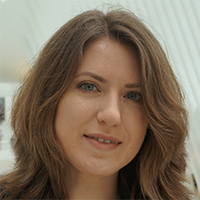
Olena Tatarchenko
Research engineer
Guest scholars

Paula Maria Bögel
Postdoctoral research fellow
I hold a B.Sc. in business psychology and a M.A. in management & marketing. For the last four years, I have worked at a research assistant at the University of Lüneburg and the University of Göttingen. In Spring 2016 I was visiting researcher the Catholic University of Zagreb. Since January 2017, I work as post-doc at the Chair of Human Behaviour and Sustainable Development (Prof. Dr. Paul Upham). Our research group focuses on the Social Psychology of Socio-Technical Transitions for Sustainability.
Selected publications
- Bögel, P. M. (2016): Company Reputation and Its Influence on Consumer Trust in Response to Ongoing CSR Communication, Journal of Marketing Communications, online first, available at https://doi.org/10.1080/13527266.2016.1166146
- Hetze, K., Bögel, P. M., Glock, Y. & Bekmeier-Feuerhahn, S. (2016): Online-CSR-Kommunikation: Gemeinsamkeiten und Unterschiede börsennotierter Unternehmen in der DACH-Region. UmweltWirtschaftaForum, 24 (2), 223-236.
- Bögel, P. M. (2015): Processing of CSR communication: Insights from the ELM, Corporate Communications: An International Journal, 20 (2), 128-143.

Testing PDF embedding
Seminar #1. Xavier Faure – From building physics to urban scales
UrbanT seminar #1.October 29, 12:10 - 12:50+ In this talk I will present an overview of different projects and applied research activities that brought me from the building physics domains up to the gate of urban scale analyses....
En stadsdel för forskning
Norra Djurgårdsstaden i Stockholm växer fram sakta men säkert. Hållbarhetsprofilen har lockat till sig ett stort antal forsknings- och utvecklingsprojekt. Byggindustrin lyfter i detta nummer fram några av dem.
Matematikern och morgondagens städer
Hon är matematikern som styr upp en gigantisk innovationssatsning kring framtidens städer. Den ska inte bara ge banbrytande innovationer som bidrar till att göra våra städer mer hållbara. Den ska även förbättra samverkan och erfarenhetsutbytet över gränserna.
Smarta lägenheter får folk att byta beteende
Listiga elnät och smarta lägenheter låter både spännande och intressanta, men fram till idag har de i mångt och mycket varit skrivbordsprodukter. KTH-forskaren Anders Nilsson ska ändra på det i ett fyra år långt forskningsprojekt i stadsdelen Norra Djurgårdsstaden i Stockholm. Han kommer att studera hur de boende använder den nya tekniken i praktiken och hur deras beteenden förändras i den smarta lägenheten.
Doktorander i Kina löser energigåta
Under två veckor träffas drygt 60 doktorander och ett antal lärare i en sino-europeisk doktorandskola.
Med gemensamma krafter letar man lösningar till hur Kina ska bli koldioxidneutralt till år 2040.


